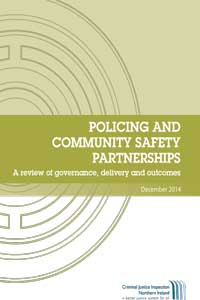A review of governance, delivery and outcomes
Publication: 04/12/14

Inspectorate calls for Police and Community Safety Partnerships to prove their value
The contribution made by Police and Community Safety Partnerships (PCSPs) in Northern Ireland to improving community safety in local areas and addressing concerns around policing issues, has been examined in an independent inspection report published today (4 December 2014).
The report by Criminal Justice Inspection Northern Ireland (CJI) which looked at governance, performance and accountability, found a lack of reliable performance information meant it was difficult to establish the overall impact of PCSPs.
It also identified that current governance arrangements were too bureaucratic and that on average 43% of the £5.5m funding provided annually to PCSPs, was being spent on administration costs.
"Some PCSPs have delivered successful projects and events while maintaining proportionate administration costs which have contributed to address local concerns around community safety," said Brendan McGuigan, Chief Inspector of Criminal Justice in Northern Ireland.
"Inspectors however found other PCSPs have struggled to evidence their worth and demonstrate the added value they have brought to local communities. Many are viewed as another committee of the local Council and have failed to secure the active involvement of many statutory providers. Voluntary and community sector representatives have also been frustrated by the slow progress to date.
PCSP Policing Committees were found to be most effective when they operated in an open transparent manner, were less adversarial and more strategic in their approach. In contrast, others monitored police performance by reviewing statistical information and seeking responses on more parochial issues," said Mr McGuigan.
Given the level of public funding currently being allocated to PCSPs, the Chief Inspector of Criminal Justice said there was a need for the groups to prove their value and reduce their administration costs if they are to be retained in the future.
"This report makes a number of recommendations designed to help PCSPs evolve and grasp the opportunity created by the establishment of a small number of larger Council areas and the introduction of community planning, to introduce greater efficiencies and effectiveness in the delivery of local services," said the Chief Inspector.
"We have recommended a performance baseline be introduced against which individual PCSP projects can be assessed and their achievements evaluated over the next four years.
"Steps must also be taken following the introduction of local government reform to reduce current administration costs so they do not exceed 20% of the budget allocated to PCSPS," he added.
Mr McGuigan said the accountability and reporting arrangements for PCSPs should also be streamlined to remove duplication and create a clearer governance structure.
This can best be achieved through local Councils providing the required assurance framework where community plans are the focal point for delivery and the PCSPs long term aims.
In conclusion, Mr McGuigan acknowledged that amalgamating the functions of the previous District Policing Partnerships and Community Safety Partnerships into a new structure was always going to present a challenge for the Department of Justice, Northern Ireland Policing Board and the District Councils.
"Without a strong framework to maximise partnership working among statutory, voluntary and community sector providers, it was inevitable that there would be inconsistency of practice across different Council areas.
"We now have a chance to assist PCSPs to continue to evolve, to strip back bureaucracy, reduce costs and refocus the activities of PCSPs to support community planning and ensure future projects receiving support from public money, are closely linked to delivering improved community safety for local communities," he said.